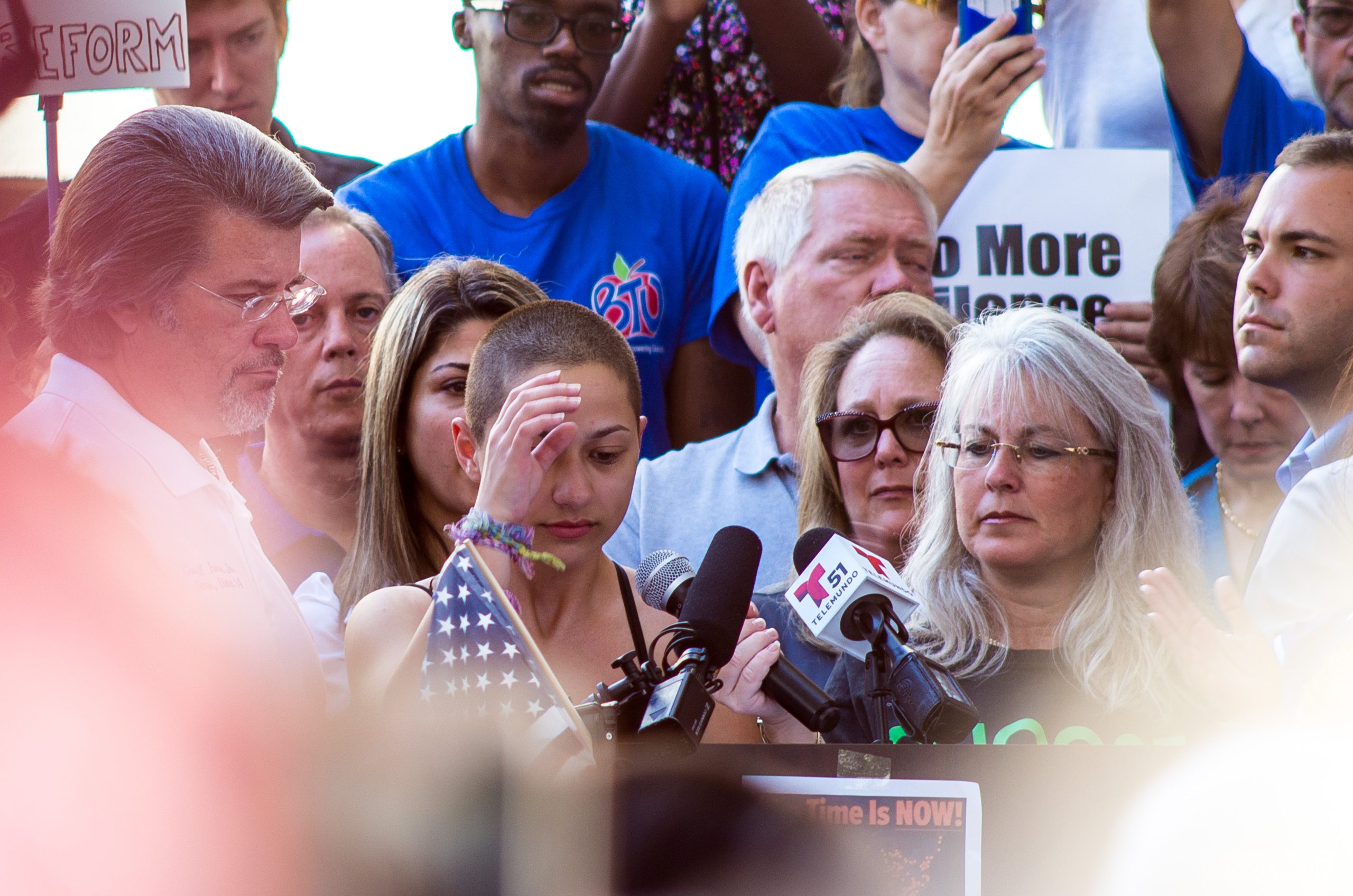
Tale til demonstration i Fort Lauderdale
Emma Gonzalez
Analyseret af Marie Nygaard, retorikstuderende ved Københavns Universitet, 2018
“If you actively do nothing, people continually end up dead, so it's time to start doing something”
Hvorfor er denne tale interessant?
Talen forvandlede den hidtil ukendte high school-elev Emma Gonzalez til en vigtig aktør og markant stemme i debatten om en skærpet våbenlovgivning. Med ordene ”we call BS” sætter hun ord på den vrede og sorg, der efter skoleskyderiet på MSD High School i februar 2018 igangsatte en bølge af demonstrationer mod den amerikanske våbenlobby. Man kan diskutere talens sproglige kvaliteter og dele af Gonzalez’ argumentation, men den unikke retoriske situation og talens efterliv på de sociale medier gør talen til et eksempel på, hvordan man kan tage ordet og dermed udøve retorisk medborgerskab.
Den retoriske situation:
Siden skoleskyderiet på Columbine High School i 1999 er debatten om den amerikanske våbenlovgivning med jævne mellemrum blusset op. Selvom skoleskyderier og skudmassakrer er et stort problem i USA, fastholder den amerikanske våbenlobby, NRA, og dens støtter retten til at bære våben og forsvare sig selv. Ved en demonstration kun tre dage efter skyderiet på MSD High School træder den 18-årige elev Emma Gonzalez frem og tilslutter sig den hastigt voksende bevægelse mod den magtfulde våbenlobby. Publikum består af lokale borgere, hvoraf mange er pårørende til ofre for skoleskyderiet. Emma Gonzalez er én ud af mange elever og ofre der både på de sociale medier og foran de mange fremmødte til demonstrationen, udtrykker deres vrede. Med sin retoriske stil formår hun at skille sig ud, og opbakningen fra publikum er massiv når de i kor råber ”We say BS”, og ”shame on you”. Situationen er derfor præget af frustration og ønsket om et opgør med politikernes passivitet og tætte forbindelser med den nationale våbenlobby.
Emma Gonzalez' tale i Fort Lauderdale
https://youtu.be/ZxD3o-9H1lY
Emma Gonzalez' tale i Fort Lauderdale
We haven’t already had a moment of silence in the House of Representatives, so I would like to have another one. Thank you.
Every single person up here today, all these people should be home grieving. But instead we are up here standing together because if all our government and President can do is send thoughts and prayers, then it’s time for victims to be the change that we need to see. Since the time of the Founding Fathers and since they added the Second Amendment to the Constitution, our guns have developed at a rate that leaves me dizzy. The guns have changed but our laws have not.
We certainly do not understand why it should be harder to make plans with friends on weekends than to buy an automatic or semi-automatic weapon. In Florida, to buy a gun you do not need a permit, you do not need a gun license, and once you buy it you do not need to register it. You do not need a permit to carry a concealed rifle or shotgun. You can buy as many guns as you want at one time.
I read something very powerful to me today. It was from the point of view of a teacher. And I quote: When adults tell me I have the right to own a gun, all I can hear is my right to own a gun outweighs your student’s right to live. All I hear is mine, mine, mine, mine.
Instead of worrying about our AP Gov chapter 16 test, we have to be studying our notes to make sure that our arguments based on politics and political history are watertight. The students at this school have been having debates on guns for what feels like our entire lives. AP Gov had about three debates this year. Some discussions on the subject even occurred during the shooting while students were hiding in the closets. The people involved right now, those who were there, those posting, those tweeting, those doing interviews and talking to people, are being listened to for what feels like the very first time on this topic that has come up over 1,000 times in the past four years alone.
I found out today there’s a website shootingtracker.com. Nothing in the title suggests that it is exclusively tracking the USA’s shootings and yet does it need to address that? Because Australia had one mass shooting in 1999 in Port Arthur (and after the) massacre introduced gun safety, and it hasn’t had one since. Japan has never had a mass shooting. Canada has had three and the UK had one and they both introduced gun control and yet here we are, with websites dedicated to reporting these tragedies so that they can be formulated into statistics for your convenience.
I watched an interview this morning and noticed that one of the questions was, do you think your children will have to go through other school shooter drills? And our response is that our neighbors will not have to go through other school shooter drills. When we’ve had our say with the government — and maybe the adults have gotten used to saying ‘it is what it is,’ but if us students have learned anything, it’s that if you don’t study, you will fail. And in this case if you actively do nothing, people continually end up dead, so it’s time to start doing something .
We are going to be the kids you read about in textbooks. Not because we’re going to be another statistic about mass shooting in America, but because, just as David said, we are going to be the last mass shooting. Just like Tinker v. Des Moines , we are going to change the law. That’s going to be Marjory Stoneman Douglas in that textbook and it’s going to be due to the tireless effort of the school board, the faculty members, the family members and most of all the students. The students who are dead, the students still in the hospital, the student now suffering PTSD, the students who had panic attacks during the vigil because the helicopters would not leave us alone, hovering over the school for 24 hours a day.
There is one tweet I would like to call attention to. So many signs that the Florida shooter was mentally disturbed, even expelled for bad and erratic behavior. Neighbors and classmates knew he was a big problem. Must always report such instances to authorities again and again. We did, time and time again. Since he was in middle school, it was no surprise to anyone who knew him to hear that he was the shooter. Those talking about how we should have not ostracized him, you didn’t know this kid. OK, we did. We know that they are claiming mental health issues, and I am not a psychologist, but we need to pay attention to the fact that this was not just a mental health issue. He would not have harmed that many students with a knife.
And how about we stop blaming the victims for something that was the student’s fault, the fault of the people who let him buy the guns in the first place, those at the gun shows, the people who encouraged him to buy accessories for his guns to make them fully automatic, the people who didn’t take them away from him when they knew he expressed homicidal tendencies, and I am not talking about the FBI. I’m talking about the people he lived with. I’m talking about the neighbors who saw him outside holding guns.
If the President wants to come up to me and tell me to my face that it was a terrible tragedy and how it should never have happened and maintain telling us how nothing is going to be done about it, I’m going to happily ask him how much money he received from the National Rifle Association. You want to know something? It doesn’t matter, because I already know. Thirty million dollars . And divided by the number of gunshot victims in the United States in the one and one-half months in 2018 alone, that comes out to being $5,800. Is that how much these people are worth to you, Trump? If you don’t do anything to prevent this from continuing to occur, that number of gunshot victims will go up and the number that they are worth will go down. And we will be worthless to you.
To every politician who is taking donations from the NRA, shame on you.
(publikum råber) shame on you.
If your money was as threatened as us, would your first thought be, how is this going to reflect on my campaign? Which should I choose? Or would you choose us, and if you answered us, will you act like it for once? You know what would be a good way to act like it? I have an example of how to not act like it. In February of 2017, one year ago, President Trump repealed an Obama-era regulation that would have made it easier to block the sale of firearms to people with certain mental illnesses.
From the interactions that I had with the shooter before the shooting and from the information that I currently know about him, I don’t really know if he was mentally ill. I wrote this before I heard what Delaney said. Delaney said he was diagnosed. I don’t need a psychologist and I don’t need to be a psychologist to know that repealing that regulation was a really dumb idea. Republican Senator Chuck Grassley of Iowa was the sole sponsor on this bill that stops the FBI from performing background checks on people adjudicated to be mentally ill and now he’s stating for the record, ‘Well, it’s a shame the FBI isn’t doing background checks on these mentally ill people.’ Well, duh. You took that opportunity away last year.
The people in the government who were voted into power are lying to us. And us kids seem to be the only ones who notice and our parents to call BS . Companies trying to make caricatures of the teenagers these days, saying that all we are self-involved and trend-obsessed and they hush us into submission when our message doesn’t reach the ears of the nation, we are prepared to call BS. Politicians who sit in their gilded House and Senate seats funded by the NRA telling us nothing could have been done to prevent this, we call BS. They say tougher guns laws do not decrease gun violence. We call BS. They say a good guy with a gun stops a bad guy with a gun. We call BS. They say guns are just tools like knives and are as dangerous as cars. We call BS. They say no laws could have prevented the hundreds of senseless tragedies that have occurred. We call BS. That us kids don’t know what we’re talking about, that we’re too young to understand how the government works. We call BS.
If you agree, register to vote. Contact your local congresspeople. Give them a piece of your mind.
(Publikum råber) Throw them out.

Foto: Barry Stock
Det siger retorikeren:
Emma Gonzalez har en interessant talerposition. Hun taler som offer for et skoleskyderi, men også som ung, studerende amerikaner, der er en del af et større aktivistisk fællesskab. Hun taler på vegne af et ”vi”, men er samtidig personlig og følelsesladet. Hun taler ind i årtiers frustrationer over de vedvarende skoleskyderier og politikernes manglende handling. Med de voldsomme begivenheder så tæt på, kalder situationen på en tale, der kan skabe mening i det meningsløse ved at sætte ord på sorgen, men vigtigst af alt ved at trække en streg i sandet og kræve handling frem for politikernes sædvanlige sympatierklæringer og bønner.
Hun har et interessant udtryk og en markant stil. Hendes påklædning og det karseklippede hår er iøjnefaldende, men også hendes brug af tavshed, pauser og råb er bemærkelsesværdig. Flere steder i talen bliver hendes råben til en form for skrig, som fx da hun henvender sig til Trump: ”If you don’t do anything to prevent this from continuing to occur, that number of gunshot victims will go up and the number that they are worth will go down”. I situationen har det en stærk virkning på publikum, der kvitterer med klapsalver og råben, men det kan også risikere at mindske hendes troværdighed. Er hun for traumatiseret og styret af sine følelser? Kunne det have styrket publikums tillid til hende hvis hendes stemmeføring havde været mere kontrolleret? Og hvilken rolle spiller hendes tårer? I talen placerer hun ansvaret hos politikerne og kritiserer dem der giver ofrene et medansvar for gerningsmandens handlinger. Hun påpeger, at eleverne har slået alarm og forsøgt at gribe ind. ”(…)you didn’t know this kid. OK, we did.” Skal det forstås som en ansvarsfralæggelse eller måske en legitimering af mobning? Og hvad gør det for hendes etos?
I de efterfølgende dage og uger gik talen viralt, og Emma Gonzalez blev kendt som aktivist i Never Again-bevægelsen og medarrangør af protestmarchen March for our Lives. Hendes optræden gav hende en platform hvorfra hun i blandt andet The Ellen Show og 60 minutes fik mulighed for at markere sig som våbenmodstander. Ved de lejligheder har hun ofte været i selskab med andre ofre og modstander af våbenlovgivningen, men hun har også optrådt alene til forskellige demonstrationer. I en tale til March for our Lives i Washinton 24. marts 2018 holder hun en pause på 6 minutter og 20 sekunder for at markere hvor lang tid gerningsmanden skød på MSD High School. Det er en utrolig effektiv måde at bruge tavshed på fordi stilheden – udover i sig selv at være ubehagelig – illustrerer hvor hurtigt man kan skyde 17 mennesker med et semi-automatisk våben. Hun afslutter talen med ordene: ”Fight for your lives before it’s someone else’s job”. Ved lejligheden er hun iført en militærjakke med We call BS-badges og hullede, stramme jeans. Det er interessant at se hvordan hendes fysiske fremtræden og talestil udvikler sig i takt med at hun cementerer sin platform. Hun fremstår mere sikker og hård, og der er ingen tvivl om at det kræver viljestyrke at gennemføre 6 minutter og 20 sekunders stilhed foran tusindvis af mennesker.
Emma Gonzalez er et eksempel på hvordan den retoriske situation indimellem kan være stærkere og mere betydningsfuld end en tales stilistiske kvaliteter. Hun udøver retorisk medborgerskab og skaber handlekraft på tværs af situationer ved at udnytte og udvikle sin platform. Den retoriske situation skaber et momentum, som hun udnytter gennem stærke argumenter, konkrete eksempler og brugen af forskellige retoriske appelformer. Talen skaber mening for et frustreret publikum og gøre dem handlingsdygtige. Den viser hvordan de rigtige ord brugt på den rigtige måde kan være med til at skabe forandring, og at selv en ukendt high school-elev fra Florida kan træde frem og tage rollen som retorisk medborger på sig.
Forslag til yderligere læsning:
School Shooting Survivor Emma Gonzalez: ‘Adults Are Behaving Like Children’ (Huffington Post)
